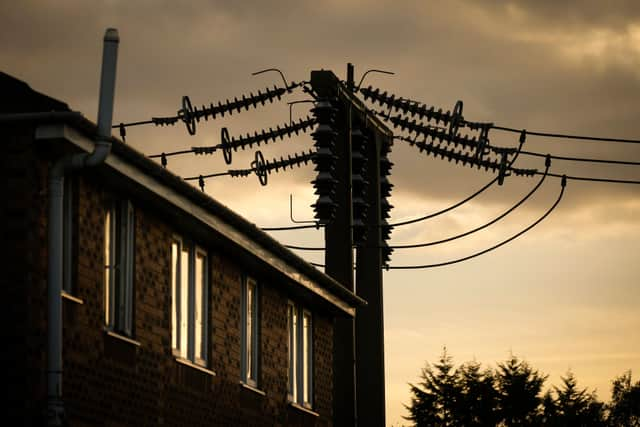Are wholesale gas prices going down? What change means for energy bills in 2023 amid UK cost of living crisis
and live on Freeview channel 276
The energy crisis has been one of the worst drivers of the overall cost of living crisis the UK has faced over the last year.
Electricity and gas bills have rocketed as a result of the Russia-Ukraine war. Given energy is required to produce pretty much everything we buy, it has forced up the cost of goods and services across the economy, as well as our domestic heating and power bills.
Advertisement
Hide AdAdvertisement
Hide AdSo bad was the situation facing the UK this winter that the government felt compelled to launch a major intervention in the energy markets - the energy price guarantee. This measure has capped units of energy and other charges - although it will become less generous from April. We have also been shielded from high energy bills by the energy bills support scheme.
But wholesale energy prices, which make up most of the cost of our energy bills, have been falling from the record highs we saw in 2022. It has provided a glimmer of hope that pressure on household budgets could soon be eased.
So, what do falls in wholesale energy prices mean for bills - and why are they likely to still go up?
Are wholesale energy prices going down?
Wholesale energy prices are falling. Thanks to the relatively mild winter we are having - although parts of the country are currently experiencing a cold spell - and Europe investing heavily in upping gas storage levels, year-ahead wholesale prices (the most relevant wholesale costs to the UK market) have come down.
Advertisement
Hide AdAdvertisement
Hide AdBut the thing to note is that they are still around four times higher than they were in October 2021 when prices first started to climb, and average energy bills under the cap are around double what they were. There are also several reasons why wholesale prices could still rise again (more on that below).


Essentially, we need wholesale prices to fall much lower - and over an extended period - before any falls translate into cheaper domestic energy bills.
Why will energy bills still go up?
Wholesale energy prices make up between 70% to 80% of a typical domestic energy bill in the UK, so prices will now go down, right? Sadly not.
To comply with the Ofgem energy price cap, energy suppliers have to hedge by buying energy in advance. What it all means for domestic energy bills is that there is a lag in the system that means wholesale prices will not be reflected in our bills for several months yet.
Advertisement
Hide AdAdvertisement
Hide AdAccording to energy consultancy Cornwall Insight, the fall in wholesale prices will not be reflected in the Ofgem energy price cap (which indicates how much bills would be without government subsidy) until the third quarter of 2023 - i.e. July to September. By this point, it reckons the energy price cap will be equivalent to £2,200 a year for a typical household - £1,000 below the Ofgem price cap coming into force from April and £800 below the energy price guarantee rate coming in from April.
However, it warned bills will still be around double what they were before the energy crisis. But the potential return of switching to fixed deals later in 2023 may drive lower prices.
Separate analysis by Investec reckons the cap will fall to £2,478 in the summer and £2,500 on average over the second half of 2023. Both of these forecasted falls will mean the cost of the energy price guarantee to the Treasury will fall.
But they also mean that our energy bills are still likely to be close to what they currently are, if not higher. So, in short, expect your energy bills to go up rather than down in 2023.
Advertisement
Hide AdAdvertisement
Hide Ad

Why else could energy bills rise?
There are also several unknowns still at play that could yet affect wholesale prices in 2023. Indeed, Cornwall Insight says it has had to insert a 10% upper and lower range into its forecasts because prices are so volatile at present.
Firstly, we have only had one cold snap so far this winter, and it was a relatively brief spell as most of winter 2022/23 thus far has been unseasonably mild. If temperatures plummet - remember, the 2018 Beast from the East did not happen until the end of February - energy demand could still spike, which would force prices up. Wholesale costs could also go up if Europe experiences a cold snap, given British prices are determined by international trends.
Secondly, 2023 could prove to be a much tougher year than 2022 because Russia has halted gas exports to Europe. The Nord Stream 2 pipeline explosion and the closure of Nord Stream 1 to allow for what state-owned gas company Gazprom referred to as ‘necessary repairs’ all but halted exports to European countries.


But countries reliant on Russian gas had already been able to build up significant reserves of the energy source that have helped them to get through this winter. According to a December 2022 report by Cornwall Insight, filling up these reserves is likely to be much more costly and challenging than in 2022 - especially if reserves become depleted over the remaining winter months by any cold spells.
Advertisement
Hide AdAdvertisement
Hide AdHow costly this process is - and how successful countries are with building up their reserves - will likely determine how expensive international energy prices will be next winter, and therefore, what wholesale prices will look like in the UK in late 2023 and early 2024.
Comment Guidelines
National World encourages reader discussion on our stories. User feedback, insights and back-and-forth exchanges add a rich layer of context to reporting. Please review our Community Guidelines before commenting.
